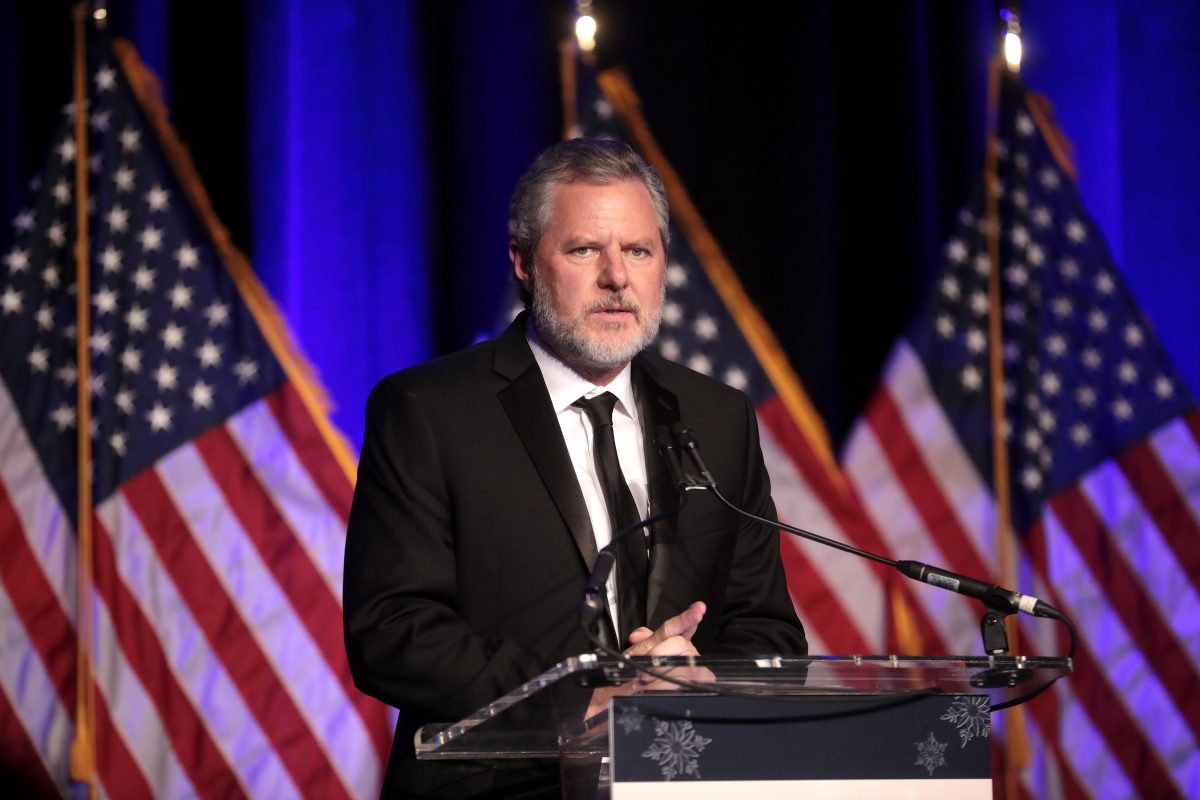
(RNS) — When Jerry Falwell Jr. inherited the presidency of the university his father founded, he was a reluctant leader, according to a recent Washington Post profile. Yet, in his 13 years in the president’s chair at Liberty, Falwell has slowly expanded his influence from Liberty University’s campus to the national political scene, and shown that leadership can be leveraged for good or cause great harm.

Jerry Falwell Jr. speaks at the 2nd Annual Turning Point USA Winter Gala at the Mar-A-Lago Club in Palm Beach, Florida, on Dec. 18, 2019. (Gage Skidmore/Creative Commons)
Currently on a leave of absence from Liberty University because of some controversial social media posts, Falwell has also demonstrated that as a leader’s influence grows, so must his or her commitment to integrity.
Unfortunately, in many cases, the longer leaders remain in leadership, the more relaxed they become about their principles and convictions. They lose sight of their original purpose, living disconnected from what they preach to others. Words do not match actions. Private lives do not match their public life. The next scandalous headline is just waiting to be written.
Every leader gets to choose when, and if, they will face their own humanity and commit to leading with greater integrity. The sooner that happens, the better. Healthy leaders do the hard work to get their baggage down to carry-on size, which prepares them to handle greater influence.
Unhealthy leaders, on the other hand, choose to ignore their integrity gaps: the expanding distance between what they preach and how they live. For those leaders, it’s a matter of time before they — and those in their wake — pay the price. Christian organizations often suffer integrity gaps harder than others, as respect for leadership can override accountability.
Many churches and Christian nonprofits leave their leaders to wrestle on their own with personal ego, addiction to power, or unresolved trauma. Some of these organizations actively dismiss anyone who dares to question the integrity of a high-profile leader. They put leaders on a pedestal, leaving them isolated and vulnerable.
Pastors, school presidents, and other high-capacity leaders can be vulnerable, as we all are, to blind spots, temptations, and minimizing their own stories, especially when their performance is impressive. Many leaders use achievement and performance to distance themselves from their own stories and in this way, power can become a form of addiction, shrouded in deep shame. And inevitably, a leader’s unresolved brokenness will leak out.
The problem isn’t the fact that leaders are human; the problem is not being honest about a leader’s humanity.
Churches and Christian organizations must stop ignoring red flags that indicate leadership integrity gaps. These red flags are often hiding in plain sight:
- A leader cannot be questioned and refuses to allow disagreement.
- A leader is excused or given a pass for bad behavior solely because of his or her leadership position.
- A leader has a continually rotating team and few long-term relationships.
- Rumors of a leader’s misconduct go unacknowledged or unaddressed.
- A leader is privately “talked to” about an integrity gap — with no plan for accountability.
- A leader who has harmed others is quickly restored to leadership — with no plan or time for repair and healing.
Leaders can shrink their integrity gaps. Organizations can create environments of truth and grace that hold leaders accountable. When leaders do err, a healthy system of truth and grace offers a process for repair, healing, and accountability.
Christian leaders need more training around healthy relationships, abuse, and trauma-informed theology, and practical steps to greater accountability. Change is possible. Join us in the mission to see greater leadership integrity, less harm to followers, and fewer church scandal headlines.





